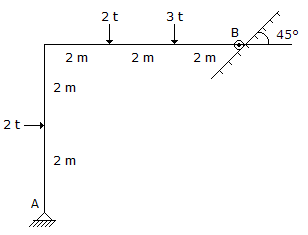Civil Engineering :: Applied Mechanics and Graphic Statics
- A sphere and a cylinder having the same mass and radii start from rest and roll down the same inclined plane. Which body gets to the bottom first?
- A light rope is loaded with many equal weights at equal horizontal intervals. The points of suspension on the rope lie on a
- If the resultant of two forces has the same magnitude as either of the force, then the angle between the two forces is
- If the resultant of two forces ‘P’ and ‘Q’ acting at an angle ‘θ’ makes an angle ‘α’ with ‘P’, then tan α equals
- The motion of a particle moving with S.H.M. from an extremity to the other, constitutes
- The angle of projection at which the horizontal range and maximum height of a projectile are equal to
- The angle of projection at which the horizontal range and maximum height of a projectile are equal to
- A rigid body is in a stable equilibrium if the application of any force


 Whatsapp
Whatsapp
 Facebook
Facebook


